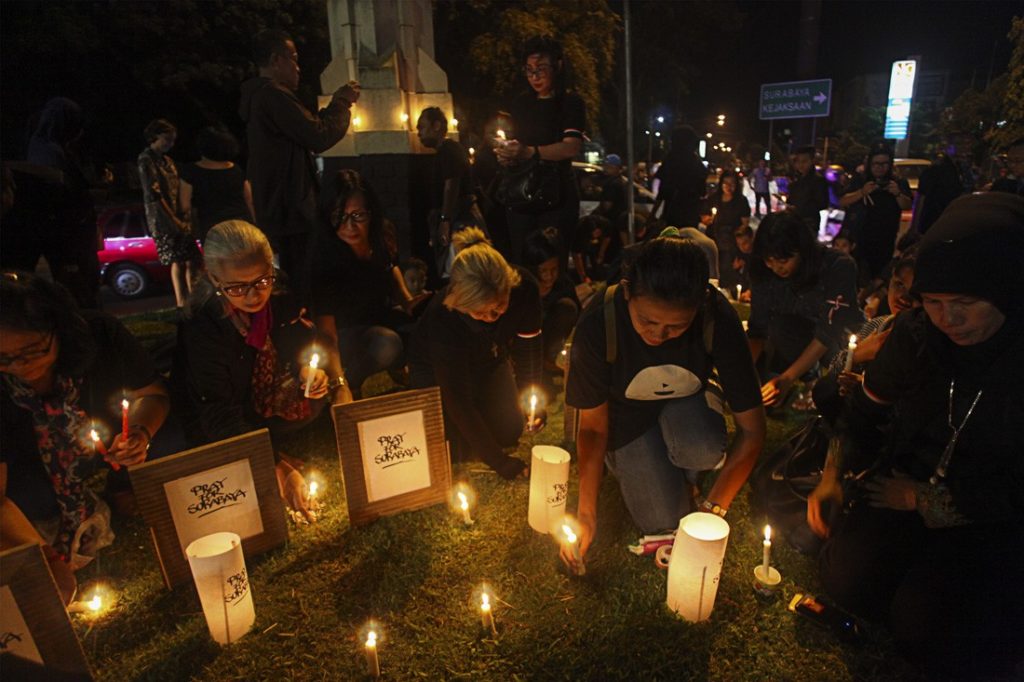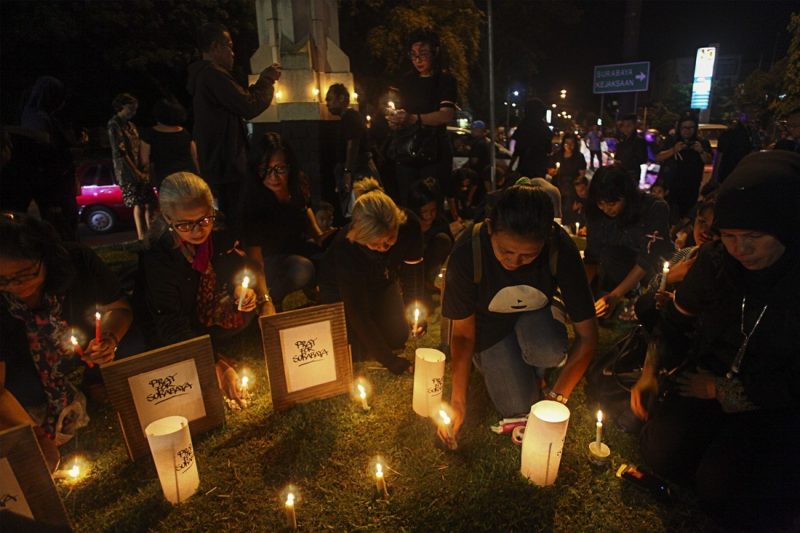
In mourning: Residents attend a candlelight vigil in Surakarta, Central Java, to pray for victims of church suicide bombings in Surabaya, East Java, and terror attacks in areas across Indonesia. (Antara/Maulana Surya)
Terror attacks occur everywhere in the world, the latest in New Zealand on March 15 and in Sri Lanka on April 21, killing hundreds of victims. However, law enforcers as well as the public pay attention mostly to the offenders, not to the victims of terrorism.
Of course people want to know who the criminals are — at the risk of them gaining publicity. The most horrific example was the attack on two churches in Christchurch, New Zealand, which killed 50 people and injured many others. Prime Minister Jacinda Ardern rightly refused to name the perpetrator who had filmed his crime and shared it in real time.
Far fewer people continue to be concerned with the victims and survivors, even though the death toll in Sri Lanka reached over 200, not to mention those severely injured; all eyes focused mainly on the perpetrators, the Islamic State group or anyone claiming responsibility for the terror attack.
Likewise in Indonesia, fewer people would recall the situation of victims of the church bombings in Surabaya just last year on May 13 and 14, 2018, the Jl. Thamrin explosions in Jakarta in 2016 and at the police station in Pekanbaru last year, etc.
Apart from direct victims, there are also secondary, indirect victims and potential victims of terrorism. Secondary victims of terrorism are the next of kin or dependents of a direct victim of terrorism. Indirect victims are individuals who have suffered severe physical or psychological injury as the indirect result of an act of terrorism, according to a 2015 report of the United Nations Office on Drugs and Crime (UNODC).
Victims of crime, including terrorism, should not be subject to secondary victimization that usually occurs not as a direct result of the criminal act causing harm to the victim but through the response of institutions and individuals to the victim.
Distinct phases follow terrorist attacks, as noted in a paper on enhancing the resilience of terrorist attack victims last year by Josie CM Netten and Maarten Van Donk. First, the impact phase: the dramatic incident takes place, wreaking havoc, death, destruction and loss. Victims and society are bewildered and are in shock.
Second, the honeymoon phase, which starts a few days after the terrible incident and may last three to six months. Relief support is provided, commemorations take place, communities and authorities organize massive spontaneous help, along with much media attention and generosity. Much social support is mobilized and available.
The third is the disillusion phase when the terrorist attack is no longer the focus of attention. Society returns to its daily routine. Other news now demands attention. The fourth is the reintegration phase. The rebuilding of lives for affected individuals and communities may take many years, the long-term phase of recovery.
In the aftermath of terrorism, as the UN has noted, “Victims of terrorism continue to struggle to have their voices heard, have their needs supported and their rights upheld.”
“Victims often feel forgotten and neglected once the immediate aftermath of a terrorist attack fades, which can have profound consequences for them”, the UN stated last year in its acceptance of the International Day of Remembrance of and Tribute to the Victims of Terrorism each Aug. 21. As daily routine returns, victims often find loss of hope, resentment, bitterness and a perception of being left alone. There is no feeling of the shared community anymore. This phase is often referred to as “the second disaster” or “the disaster after the disaster”. This period may last for several years, as the above researchers confirmed.
For instance, how many of us still remember the survivors of the 2002 Bali bombings, the JW Marriot Hotel bombing in 2003, the Australian Embassy bombing in Jakarta in 2004, the second JW Marriot Hotel bombing and the Ritz Carlton Hotel bombing in Jakarta in 2009?
Most of us do not know their present condition, the fate of their families nor if the victims are still alive, how they deal with their jobs, career and health in the aftermath of the incidents.
The scholar Supriyadi Widodo Eddyono wrote in 2016 that according to data provided by Yayasan Penyintas Indonesia (Foundation of Indonesian Survivors of Terrorism), among 544 victims of terrorism, as of then none had received compensation from the state. Also, in the aftermath of the Thamrin attacks of 2016, those responsible for financing medical treatment of the victims were unclear and not well coordinated.
Therefore, our serious challenges now are how to support the neglected victims of terrorism and how to prevent them from secondary victimization.
The primary responsibility to support victims of terrorism and uphold their rights rests with the state. Society including the private sector, media, education institutions and communities and families also share responsibilities related to the direct and indirect victims. The state should provide immediate medical assistance and long-term psychosocial support for the victims, not to mention easily accessible compensation.
The state should develop government strategies, policies and legislation for adequate responses to support victims of terrorism within the criminal justice framework. The state should also deal with the needs of victims and their families immediately after a terrorist attack, as a UNODC report cited in 2017.
Furthermore, the state should ensure that victim support professionals are assigned to victims at an early stage of investigation to inform them of all available support services and identify their needs.
All professionals dealing with victims must receive specific victim-sensitive training on the needs of victims, strategies for appropriately dealing with them and the need to prevent secondary victimization.
The mass media must also respect the rights of victims of terrorism and comply with the ethical code in reporting victims of terrorism. Do not let the media, including social media, revictimize the victims by exploiting the suffering of the victims, for example by constantly interviewing and excessively exposing victims’ families in the aftermath of terrorist acts.
Last but not least, cross border victims of terrorism must be taken into account. For instance, there were Indonesian citizens among the victims of the 9/11 terrorist attacks of 2001 in the United States and the Christchurch attack this year.
The treatment of victims of terrorism should always be in the honeymoon phase, not in the disillusion phase. And there must be a balance between the attention paid to offenders and to victims.
The writer is an associate professor at the Faculty of Law, University of Indonesia (UI), and is on the executive board of Victim Support Asia.
Disclaimer: The opinions expressed in this article are those of the author and do not reflect the official stance of The Jakarta Post.
Sumber:
https://www.thejakartapost.com/academia/2019/06/14/supporting-neglected-victims-of-terrorism.html

